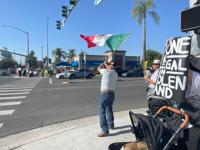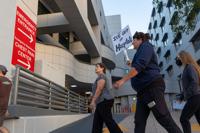
Protest against deportations in Riverside, California on February 2, 2025. (Denise Florez/CALÓ News)
From the moment he took office on January 20, 2025, President Donald Trump has signed and approved over 80 memos and executive orders. More than a dozen of them are related to immigration, causing nationwide concern and panic, particularly in communities with large Latino populations.
Trump said his administration would focus on the arrest and deportation of undocumented criminals. But media reports have shown that in the past weeks, many individuals who don’t have criminal records have been affected by the raids.
Being undocumented in the United States is not considered a crime but a civil offense. However, an undocumented immigrant is considered a violator if convicted of driving under the influence (DUI), drug possession, assault and/or criminal (non-civil) traffic offenses such as hit-and-run or leaving the scene of an accident. Those who have broken immigration laws by reentering after being deported and overstaying their visa are also considered violators and subject to being deported, according to the U.S. Immigration and Customs Enforcement (ICE).
Recently, Tom Homan, Trump’s border czar, told NBC News he was aware of some collateral arrests, specifically people without criminal records being deported. He said this will likely continue if they are present during the raids.
"We want to get as many criminals as possible," Homan told NBC. "They’re a public safety threat, and so with somebody else illegally here, they’re coming, too."
Experiences in the community
On Friday, during a national press conference via Zoom, activists advocating to keep families together highlighted the trauma the raids are causing in immigrant communities.
Noel Candelaria, secretary-treasurer of the National Education Association (NEA), said everyone living here should have access to education and to thrive. As an educator in El Paso, Texas, he has seen fear in entire families.
Candelaria said children are in a very difficult situation because while they have a constitutionally protected right to public education, the mass deportations by the Trump administration are causing irreversible harm. They don’t want to leave their homes and are afraid to lose their parents and siblings due to immigration raids or on their way to school.
“[Trump] calls children, our students ‘criminals’. Children who are exercising their right to attend public schools are not criminals. No one should demonize them for political gain,” he said.
Another group experiencing extreme fear are Venezuelans with Temporary Protected Status (TPS)
Greg Chen, senior director of government relations for the American Immigration Lawyers Association (AILA), said about 600,000 Venezuelans are at risk of deportation after the extension declared by former President Joe Biden the week before Trump took office was vacated by the Trump administration. Venezuelans will have their TPS until April of this year but what will happen after is unknown.
People must take action
Pedro Trujillo, representative of the Coalition for Humane Immigrant Rights of Los Angeles (CHIRLA), said they have received hundreds of phone calls from people requesting information to learn their rights if they are stopped by ICE after reporting seeing agents in their communities.
CHIRLA is part of a coalition of 20 organizations and more than 100 volunteers in the Rapid Response Network, which focuses on informing and helping the undocumented community.
Trujillo said since Trump took office, he has learned two people detained by federal immigration agents signed a voluntary departure, and one asked to see a judge in court. This will take about three months. He said a man was picked up by ICE while walking with his wife on a Sunday morning. His wife knew her right to remain silent and could walk away without being detained.
CHIRLA has conducted hundreds of workshops in person and online through the “Know Your Rights” presentations to let them know what to do if immigration officers stop them.
“We have a weekly one-hour Spanish language show live stream on CHIRLA Facebook page called ‘CHIRLA en tu Casa’,” Trujillo said.
Meanwhile, the Rapid Response Network encourages members to report any ICE enforcement actions in the region. Trujillo said it is vital for families to be prepared just as when residents are asked to be prepared for a natural disaster. They must have all their important documents ready.
The rapid response phone number and hotline is (888) 624-4752.











(0) comments
Welcome to the discussion.
Log In
Keep it Clean. Please avoid obscene, vulgar, lewd, racist or sexually-oriented language.
PLEASE TURN OFF YOUR CAPS LOCK.
Don't Threaten. Threats of harming another person will not be tolerated.
Be Truthful. Don't knowingly lie about anyone or anything.
Be Nice. No racism, sexism or any sort of -ism that is degrading to another person.
Be Proactive. Use the 'Report' link on each comment to let us know of abusive posts.
Share with Us. We'd love to hear eyewitness accounts, the history behind an article.